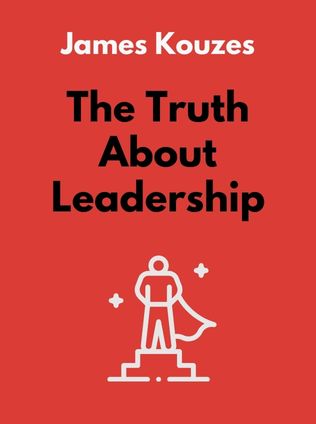
The Truth About Leadership
The No-Fads, Heart-of-the-Matter Facts You Need to Know
By James Kouzes,
Published 08/2010
About the Author
James M. Kouzes is the Dean's Executive Professor of Leadership at the Leavey School of Business at Santa Clara University. He is one of the leading executive educators in the United States and has received numerous accolades for his contributions to the field of leadership. His extensive research and teaching have made him a sought-after speaker and consultant on leadership and organizational development.
Barry Z. Posner is a Professor of Leadership at Santa Clara University, where he served as Dean of the Leavey School of Business for 12 years. Posner is renowned for his work in leadership education and has authored numerous books and articles on the subject. Together, Kouzes and Posner have authored several best-selling books on leadership, including 'The Leadership Challenge,' which has been widely acclaimed and used by leaders around the world to enhance their leadership skills.
Main Idea
In 'The Truth About Leadership,' James M. Kouzes and Barry Z. Posner distill 30 years of research and over one million responses from their leadership assessment to uncover ten fundamental truths about leadership. These truths reveal what all leaders must know to be effective, emphasizing that leadership principles are timeless and universal, transcending fads and trends. The book aims to guide both emerging and experienced leaders in understanding the heart of leadership and its essential practices.
Table of Contents
- You Make a Difference
- Credibility Is the Foundation of Leadership
- Values Drive Commitment
- Focusing on the Future Sets Leaders Apart
- You Can't Do It Alone
- Trust Rules
- Challenge Is the Crucible for Greatness
- You Either Lead by Example or You Don't Lead at All
You Make a Difference
The first truth is that You Make a Difference. Leadership starts with the belief that you can have a positive impact on others. This truth emphasizes the importance of self-belief and the understanding that leadership begins with the individual's conviction that their actions matter.
"Before you can lead others, you have to lead yourself and believe that you can have a positive impact on others." - James M. Kouzes
Leaders influence their immediate environment the most. Your most significant impact is on those who work directly under you, not the CEOs or other high-ranking officials unless you report directly to them.
- A manager who believes in their ability to lead inspires their team to achieve more.
- A teacher who believes in their impact can change the lives of their students.
- A parent who believes in their influence can shape their children's futures positively.
This principle is foundational because it sets the stage for all other leadership behaviors. When you believe that your actions can make a difference, you are more likely to take initiative, to inspire others, and to drive positive change. This self-belief is not about arrogance or overconfidence; it's about recognizing your potential to influence and lead effectively.
Furthermore, this belief in making a difference empowers leaders to face challenges head-on. When leaders understand that their actions matter, they are more resilient and persistent in overcoming obstacles. They do not shy away from difficult decisions or challenging situations because they know that their efforts can lead to meaningful outcomes.
In practice, this truth can be seen in various leadership roles. For instance, a community leader who believes in their ability to improve local conditions will work tirelessly to address issues such as crime, education, and public health. Similarly, a corporate leader who believes in their potential to drive innovation will inspire their team to explore new ideas and technologies, leading to groundbreaking products and services.
Credibility Is the Foundation of Leadership
The second truth is that Credibility Is the Foundation of Leadership. Without credibility, a leader cannot inspire trust or commitment from their followers. Credibility is built through honesty, competence, and the ability to inspire.
"Only credible leaders earn commitment, and only commitment builds and regenerates great organizations and communities." - Barry Z. Posner
Leaders must meet the expectations of their followers by demonstrating honesty, forward-thinking, inspiration, and competence.
- A leader who consistently delivers on promises builds trust with their team.
- An honest leader who admits mistakes earns the respect of their followers.
- A competent leader who inspires through vision motivates their team to strive for excellence.
Credibility is not something that can be established overnight. It is built through consistent actions and behaviors that demonstrate reliability, integrity, and competence. Leaders who are credible are seen as trustworthy and reliable, and this trust forms the foundation of a strong leader-follower relationship.
One of the critical aspects of building credibility is transparency. Leaders who are open and honest about their intentions, decisions, and mistakes foster a culture of trust and respect. For example, when a leader openly discusses the challenges facing the organization and the steps being taken to address them, employees are more likely to feel informed, valued, and involved in the process.
Another essential element of credibility is competence. Leaders must have the knowledge, skills, and abilities to perform their roles effectively. This includes staying informed about industry trends, continually developing their skills, and seeking feedback to improve their performance. Competent leaders are not only effective in their roles but also serve as role models for their teams, demonstrating the importance of continuous learning and development.
Sign up for FREE and get access to 1,400+ books summaries.
You May Also Like
The Subtle Art of Not Giving a F*ck
A Counterintuitive Approach to Living a Good Life
By Mark MansonRich Dad Poor Dad
What the Rich Teach Their Kids About Money - That the Poor and Middle Class Do Not!
By Robert T. KiyosakiHow To Win Friends and Influence People
The All-Time Classic Manual Of People Skills
By Dale CarnegieQuiet: The Power of Introverts
The Power of Introverts in a World That Can't Stop Talking
By Susan Cain



















